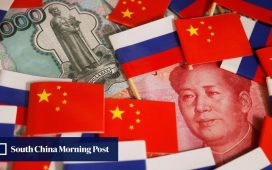“It will not shake the firm will of the 1.4 billion Chinese citizens, which include our Hong Kong compatriots, to protect our national sovereignty, safety and development interests.”
The new ordinance – a requirement under Article 23 of the Basic Law, the city’s mini-constitution – would accelerate Hong Kong’s progress from stability to prosperity, and allow it to harness its unique advantages and status, he added.
The spokesman also questioned the human rights situation in the United States, noting the country had its own stringent national security laws.
The office said the comments by Blinken, the US secretary of state, and lawmakers were proof of double standards, bullying and sinister intentions.
Hong Kong’s security chief, Chris Tang Ping-keung, also weighed in, saying Blinken’s remarks showed his “despicable political manoeuvre and hypocrisy with double standards”.
He said the offences endangering national security stipulated by the ordinance targeted such acts with precision, and defined the elements and penalties with clarity.
“The ordinance will not affect normal business operations and normal worldwide exchanges of local institutions, organisations and individuals,” Tang said.
The US Congressional-Executive Commission on China on Friday called for fresh sanctions targeting Hong Kong officials responsible for the passage of the law.
The body, a US Congress advisory panel, also vowed to expedite legislation to strip Hong Kong’s American-based trade offices of special privileges.
In a separate statement later that day, Blinken expressed concern over Hong Kong’s domestic national security law, arguing it would have “broad implications” for US citizens and city residents.
The law was vaguely defined and included provisions on sedition, theft of state secrets and interactions with foreign entities that could be used to “curb dissent”, he said.
Tang and Secretary for Justice Paul Lam Ting-kwok told a radio programme on Saturday that new powers granted under the ordinance would not be used to send cases for trial on the mainland or to restrict press freedom.
The Article 23 law grants the city’s leader powers to create subsidiary legislation for “safeguarding national security” and “better carrying into effect” interpretations of national security laws.
Tang said they only intended to use such powers to work out the details and procedures surrounding the execution of Article 23, adding that it could not be used to override what was listed in the new ordinance.

“I must state clearly here,” Lam said. “Article 55 of the national security law is very clear on this, it covers the four crimes designated under the national security law. It will not cover the offences under the Safeguarding National Security Ordinance.
“It is absolutely impossible for us to expand these powers through subsidiary legislation.”
Security chief Tang also emphasised that any subsidiary legislation under the newly enacted law would not surpass the scope of the ordinance.
This would prevent a situation where media outlets were regulated using any new powers granted under subsidiary legislation, he said.
“There is no reason or motive for people to think that there is a new law where we will use such a convoluted and complex way to add restrictions to the press,” he said.
“This does not align with common sense and there is no truth to this thinking.”
Financial Secretary Paul Chan Mo-po, meanwhile, said the passing of the Article 23 legislation would be very beneficial to the city’s business environment.
“Recalling the period of black violence in 2019, we all realised that having a safe and stable environment to conduct business is very important, especially so for the finance and commerce sector, for operations and to attract investments,” he told a radio show, referring to anti-government protests in Hong Kong.
Chan rejected the notion that foreign businesses had doubts about the law, saying it was normal for businesses to be concerned about legislation in places where they invested.
He also said that a warning by Australia to its nationals that they could unintentionally break the law when travelling in Hong Kong was unlikely to affect commercial activity.
“Politics and commerce can be separated. On the political side, they have to put on a front, but businesspeople are the most pragmatic. Businesses expressed great interest in investing in Hong Kong,” he said.
“For example, they were very happy when mainland China removed taxes on Australian wine. So I think the business situation is a lot better than we imagine.”
Former city leader Carrie Lam Cheng Yuet-ngor said the introduction of the 2020 national security law and “patriot-only” electoral reforms had not undermined Hong Kong’s appeal to talent, as shown by the popularity of the Global STEM Professorship Scheme.
The scheme was launched in June 2021 under her purview and had since brought 91 academics into the city, she said.
“I hope everyone can rest assured that establishing a secure situation [in Hong Kong] will be beneficial to our future development,” Lam said in a rare public speech at an event marking the 10th anniversary of the Shenzhen campus of the Chinese University of Hong Kong.
“Hong Kong is characterised by an open, free, inclusive and diverse society. These advantages and characteristics of Hong Kong have not been easy to come by and I very much hope that these characteristics will not change.”













